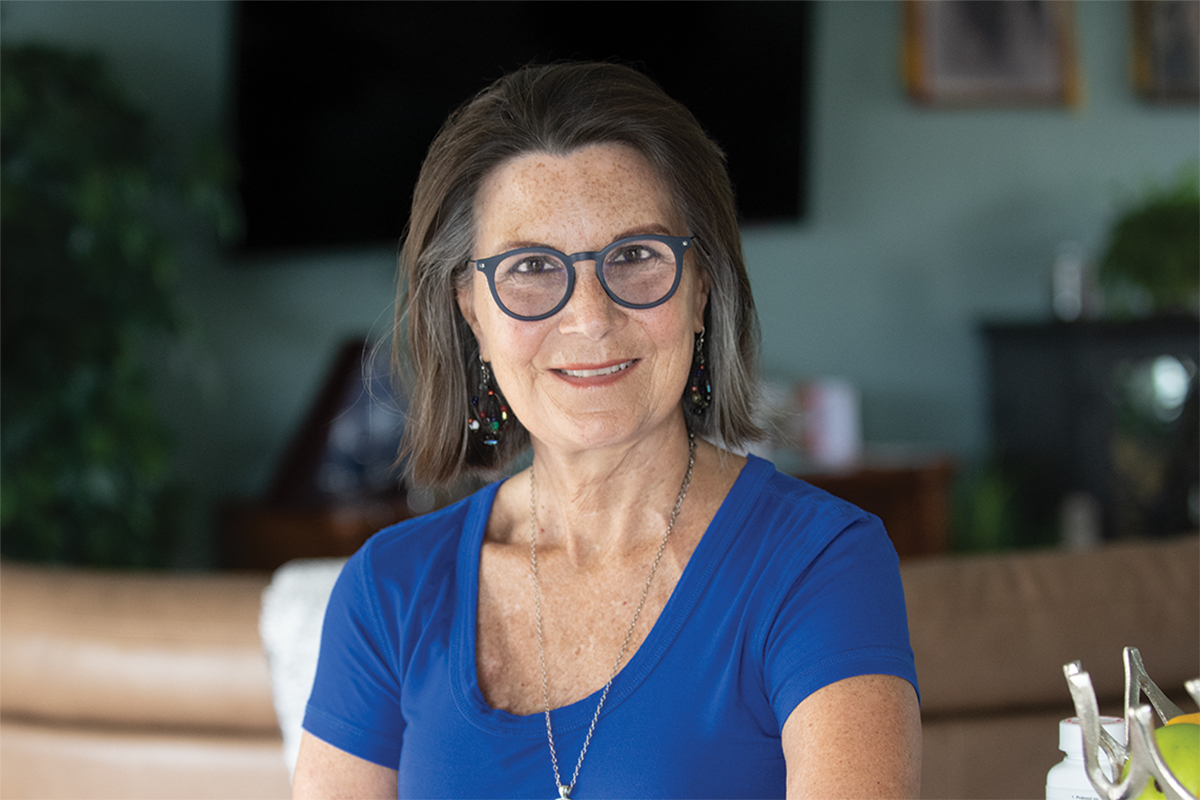
Middle school chorus and orchestra teacher Melissa Crouse had lived in the Pittsburgh area her whole life. But on a trip to visit her brother in southwest Florida, she decided on a whim to apply for teaching jobs there. The single mom, then 51, quickly received an offer.
“Three big things happened to me at the same time,” Melissa says. “I moved, I started a new job, and, after getting a physical for my new job, I was diagnosed with stage II lung cancer.”
Melissa, who hadn’t had any symptoms, was grateful that her cancer had been detected early. She had surgery at a Florida hospital, followed by chemotherapy. For four years, scans of her lungs were clear, but in 2009, her radiologist saw something concerning in the corner of the image. Follow-up tests revealed that although her lungs were clear, her liver was full of tumors.
Around that time, she heard that Massachusetts General Hospital in Boston was looking for relatively young women who had never smoked for a trial of a new lung cancer drug. She was accepted into that trial, but the treatment didn’t work for her for very long.

“After that, I got proton therapy, and I bounced from trial to trial,” she says. “Some of the treatments were tolerable, but most were not. None of them worked well, but together they kept me alive. Then I learned about a new drug that targeted a genetic change called a RET fusion, which had been found in my tumor.”
RET fusions occur when part of the gene RET gets rearranged and attaches itself to another gene. That creates what is called an oncogene, a kind of zombie gene that takes over normal behavior and drives cells to grow out of control — leading to cancer.
Researchers aren’t sure what causes this to happen or why it’s most often found in lung cancer. RET fusions have also been found in certain kinds of thyroid cancer and, less frequently, in other cancers.
Melissa’s oncologist in Boston was slated to be an investigator on the new drug trial, but not right away. “He told me, ‘You need to be on this drug now,’” she remembers. “I couldn’t wait.”
In April 2017, Melissa had her first appointment with Memorial Sloan Kettering medical oncologist Alexander Drilon. Dr. Drilon was leading the international trial of what was then called LOXO-292. Three months later, she received her first dose of the drug, which is taken as a pill.
A scan in September of that year showed that her tumors were shrinking, and since April 2020 she has had no evidence of disease. The only side effect she’s experienced is fatigue, although at times it has been severe.
Research Leads to Increasingly Specialized Drugs
Dr. Drilon leads MSK’s Early Drug Development (EDD) Service, which conducts phase I trials of promising new targeted therapies for solid tumors in both adult and pediatric patients.
“Melissa’s experience was remarkable,” says Lauren Kaplanis, a clinical trials nurse who works with Dr. Drilon. “And it was repeated in many of the nearly 100 people we’ve treated with this drug so far.”
In May 2020, LOXO-292, now known as selpercatinib or RetevmoTM, received approval from the US Food and Drug Administration for the treatment of lung cancer and thyroid cancer with RET fusions or mutations. In September 2020, a study was published in the New England Journal of Medicine that looked further at the outcomes of people treated with the drug.
The research, led by Dr. Drilon, found that among people with lung cancer who had previously received other treatments, 64 percent had their tumors shrink substantially. After a year of taking the drug, nearly two-thirds of those patients were still responding well. For those who had never received any treatment, the response rate was even higher at 85 percent.
Selpercatinib isn’t the only RET drug that’s shown success. Also in September, a drug called pralsetinib (GavretoTM) received FDA approval.
Lung Cancer Treatment Gets More Personal
“We’ve known about the link between RET fusions and lung cancer since 2011, but prior to the start of the selpercatinib trial in 2017, there were no drugs that were designed to optimally target only the RET protein,” Dr. Drilon says.
“Selpercatinib works so well because it’s very specific,” says MSK medical oncologist Ezra Rosen, a member of the EDD Service who was also involved in the trials. “That means that it doesn’t have many side effects.”
Selpercatinib also works on a range of thyroid cancer types with different kinds of mutations.
Dazhi Liu is a clinical pharmacist who is a crucial part of the EDD team. Clinical pharmacists, along with nurses, are on the front lines of recognizing and controlling side effects from cancer drugs, especially new drugs that have effects that are not yet completely understood. “The EDD Service was involved in this clinical trial from the beginning,” Dr. Liu says. “It was a great opportunity for us to see so many of our patients enrolled and helped by this drug.”
As Chief of MSK’s EDD Service, Dr. Drilon is involved in many trials studying newer, more-precise drugs to treat specific mutations in lung cancer. “Lots of people have heard about using immunotherapy drugs to treat lung cancer,” Dr. Drilon says, adding that his patients often ask him if immunotherapy is an option for them. “But for people whose cancer is caused by one of the mutations that drive tumor growth, targeted therapies tend to work much better.”
RET fusion is only one of the many cancer-driving gene changes found in lung cancer that now have drugs designed to target them. These sound like an alphabet soup — EGFR, ALK, ROS1, BRAF, MET, NTRK — but in an era of molecular testing and personalized medicine, they are becoming increasingly familiar among doctors and patients alike.
Each of these mutations or fusions make up only a small percentage of lung cancer cases, but because lung cancer is diagnosed in more than 228,000 people in the United States annually, together the combined influence of these targeted treatments can benefit tens of thousands of people with lung cancer every year.
Unfortunately, many tumors eventually outsmart targeted drugs like selpercatinib and learn to start growing again. Dr. Drilon and Dr. Rosen are doing research in this area, too. They have identified drugs that can be added to treatment with selpercatinib so that patients can continue to do well.

From Teacher to Advocate
Melissa, who is now 67, had worked throughout all of her previous treatments, but when she was accepted into the selpercatinib trial, she decided to retire from teaching. “I didn’t think I could keep working and go through another trial because of the side effects on the other ones,” she says. “If I had known then what I know now, I wouldn’t have retired.” She continues to take selpercatinib daily, and so far her tests have shown no signs of her cancer returning.
A self-described Type A personality, Melissa has not been taking it easy in her retirement. She’s become an activist and patient advocate, even starring in an Emmy Award-winning documentary about lung cancer called Melissa’s Story. She lobbies Congress and the pharmaceutical industry for more research funding. She believes that lung cancer has been shortchanged due to the stigma of its connection to smoking. “Anyone can get lung cancer, whether they smoke or not,” she says. “That’s an important message to get out there.”
Philanthropy has been essential to the growth of the Early Drug Development Service. Entrepreneur and philanthropist Michael Repole has provided crucial support to Alexander Drilon’s work through his private foundation, Nonna’s Garden, since 2018.
Another issue that she feels strongly about is that companies should do more to help people who want to participate in trials. “The drug company covered travel and lodging for my monthly trips to MSK, which had not been the case with previous trials I was in,” she notes. “I wouldn’t have been able to participate in the trial if they hadn’t offered that financial support.”
When the COVID-19 pandemic began in March 2020, Melissa started having her scans and bloodwork done at a hospital near her home in Florida and having telemedicine visits with Dr. Drilon. Although she misses seeing her MSK team in person, it was an easy transition.
As quarantine restrictions eased up over the summer and fall, she was able to spend time with her three adult children and their families, all of whom now live close to her. She doesn’t take any of it for granted.
“Selpercatinib was my sixth clinical trial,” she says. “I don’t think I’d still be here today without it.”



